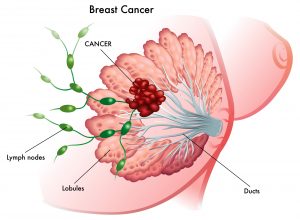
As more and more consumers become aware of the risks of traditional cancer treatments, hospitals in the United States are finally beginning to respond. Some doctors are becoming open to modalities which can complement traditional cancer treatment. U.S.-based clinical trials show cyroablation to be especially effective for early-stage Breast Cancers.
What is Cryoablation?
Cryoablation is a way of destroying cancer tumor cells through the use of deep-freeze. A doctor first uses ultrasound imaging to identify the tumor. Next, he inserts a very thin, needle-like instrument called a cryoprobe directly into the tumor. The device releases liquid nitrogen gas inside the tumor, which can be as cold as -75 °C. This freezes the tumor. Then the practitioner allows the tumor to thaw. The process is repeated several times until enough blood flow is interrupted to cause cancer cell death, or apoptosis.
The procedure can be done in an outpatient setting while the patient is under local anesthesia. What’s more, it is considered fairly safe. In fact, many studies have pointed to the success of cryoablation for chronic atrial fibrillation, also known as arrhythmia, in both adults and children. For this condition, liquid nitrogen is used to freeze abnormal electrical pathways in the heart.
The modality has also been successful for removing noncancerous tumors in the breast (called fibroadenomas) as well as in the treatment for liver, lung, cervical, prostate, eye, bone and kidney cancers. For an interesting 30 second video showing cryoablation in action on a liver tumor, click HERE.
Cryoablation and Breast Cancer
Cryoablation for cancer is sometimes also called percutaneous cryoablation, cryosurgery or cryotherapy. Interestingly,  research into how super cold temperatures can kill cancer cells has been ongoing since the early 1900’s. The medical establishment in Europe recognized cryotherapy as a viable treatment modality for cancer and other conditions in the 1990’s. In the United States, the “Frosty” trial, sponsored in part by the Mayo Clinic, put cyroablation on the map for patients suffering from tachycardia. The success of this modality paved the way for more cancer-specific studies.
research into how super cold temperatures can kill cancer cells has been ongoing since the early 1900’s. The medical establishment in Europe recognized cryotherapy as a viable treatment modality for cancer and other conditions in the 1990’s. In the United States, the “Frosty” trial, sponsored in part by the Mayo Clinic, put cyroablation on the map for patients suffering from tachycardia. The success of this modality paved the way for more cancer-specific studies.
Cryoablation in Clinical Trials
In 2003, radiologist Dr. Peter Littrup began performing cryoablation on women with Stages I through IV Breast Cancer with great success. Recently, new clinical trials have been underway to test cryoablation’s effect on early stage Breast Cancers. A 2016 phase II clinical trial on cryoablation and early Breast Cancer was conducted by New York Presbyterian Hospital and the Joan and Sanford Weill Medical College of Cornell University. The study took place with the participation of researchers in over a dozen other U.S. institutions. These included Duke University, MD Anderson Cancer Center and the University of Southern California.
The study examined 86 patients at 19 centers across the country. They found that cyroablation had a 92 percent success rate for destroying targeted cancers. It also had a 100 percent success rate at getting within one centimeter of the targeted tumor. A report of the clinical trial was published in the Annals of Surgical Oncology.
“Minimally invasive techniques are becoming increasingly popular in cancer care, and cryoablation represents a valid option for early stage Breast Cancer treatment,” Dr. Rache Simmons, chief of breast surgery at New York-Presbyterian/Weill Cornell Medical Center, told reporters for a recent article in Science Daily. “The results from this trial are extremely promising, and we look forward to exploring the technique for a greater number of patients.”
More Info on Cryoablation
Cryoablation is still an approved complementary modality in the U.S. for many kinds of cancer and other conditions. Sadly, however, certain policies under Obamacare drove the procedure “underground” for Breast Cancer in 2013. The Ice3 Clinical Trial has been studying the effects of cryoablation for early stage Breast Cancer since 2014—and it is still going on. For more information and participation requirements, click HERE. In addition, there are a few clinics outside the U.S., including the Williams Cancer Institute in Mexico, who perform cyroablation for Breast Cancer.
It is frustrating to see that more women do not know about nor have access to cryotherapy for Breast Cancer. But now you know.
Dr. Veronique Desaulniers (“Dr V”) is the founder of Breast Cancer Conqueror.com and The 7 Essentials System ™. This step-by-step guide empowers you with knowledge so you Never Have to Fear Breast Cancer Again! To watch a FREE webinar about the 7 steps for beating breast cancer naturally, Click Here.

Yesterday, I had cryoablation by Breast Surgeon, Dr. Dennis Holmes for a 1cm breast tumor, stage 1. The procedure went well and I am taking tylenol 500 mg for pain. I am very pleased with the results due to Dr. Holmes brilliance and ingenuity. I am currently participating in the Frost Clinical Trial. Dr. Holmes is the Principal Investigator for the Frost Clinical Trial. They are currently accepting new patients ( site: Glendale Adventist Medical Center 1505 Wilson Terrace #150 Glendale, Ca 91206 (818) 539-1985 24 hours). Cryoablation can also be performed off protocol, if you decide not to participate in the Clinical Trial ($6000.00). Dr. Holmes is very warm, compassionate, kind, and patient . He answered all of my questions. Dr. Holmes is a world renowned Breast Surgeon, researcher, and innovator with 20 years of experience. Dr. Holmes is also a world-recognized expert in targeted intraoperative radiotherapy. In addition, Dr. Holmes performs breast reconstruction, lumpectomy, lymph node sparing, oncoplastic surgery, nipple sparing mastectomy, and intraoperative radiotherapy.. Most importantly, Dr. Holmes is dedicated, devoted, and determined to give women the best options in treating their breast cancer.
Thank you so much for this information, Shelley. Very appreciated!
Thank you Shelley,
I am contacting Dr. Dennis Holmes. Very much Appreciate this information.
You are so very welcome!
I had cryoablation with Dr. Holmes in Sept 30, 2020
And just had my follow up scans and biopsy and everything came back benign. No cancer. It’s the best procedure and Dr. Holmes is the best surgeon. I totally agree sloth your comments about him. I don’t think it’s possible to find a better surgeon.
I just had cryoablation as well with Dr. Bednarski in Myrtle Beach, SC. Did you still need to do radiation therapy ? thank you 🙂
Hi My name is Carolyn and I had a mastectomy done 18 months ago, but 6 months after my surgery I developed a rash on my incision site and have had two episodes of this occur. It is so painful and difficult to get ride of the rash. I at present have my second rash and I am having a very difficult time getting ride of it this this time. It only occurs on my incision site and once on my ring finger. I have and am using Pad Arco and essential oils.
Can someone let me know if they have had a similar occurance and what they did to rid themselves of this horrible rash.
Hi Carolyn! You could consider having thermography done to the breast to determine what may be causing the underlying inflammation. You can also consider using garlic, Argentyn 23, medicinal mushrooms and other immune system boosting supplements to ensure that your immune system is taking care of any infection present.
Any one know of any doctors close to Louisiana or texas that do Cryoblation for breast cancer?
Hi Yvonne! We don’t have a listing for Louisiana OR Texas, but I will email you with the listings we have!
Dr. Bednarski in Myrtle Beach, South Carolina 🙂
Hi would love to know in UK any cryoblasion? Thanks
Why not try to call one of these places to see if they can provide more information…. https://www.cancerresearchuk.org/about-cancer/cancer-in-general/treatment/other/cryotherapy https://www.myhealthspecialist.com/clinic/the-christie-private-care https://icecure-medical.com/
Just an update on cryoablation for breast. Clinical trials finished up for early catch and less than 1.5mm April 2021. FD A approved it and medicare is beginning to provide reimbursement. The insurances are catching up but you will likely need to do an approval request. Further trials are going on for more advanced with nodes. Hope that helps. From what I understand , they prefer less than 3cm and location also matters
Thanks for the info Mary!
Thank you Mary. Do you know if this is still true? I am looking to have this done and have a tumor less than 3 cm. I am going to run it through insurance.